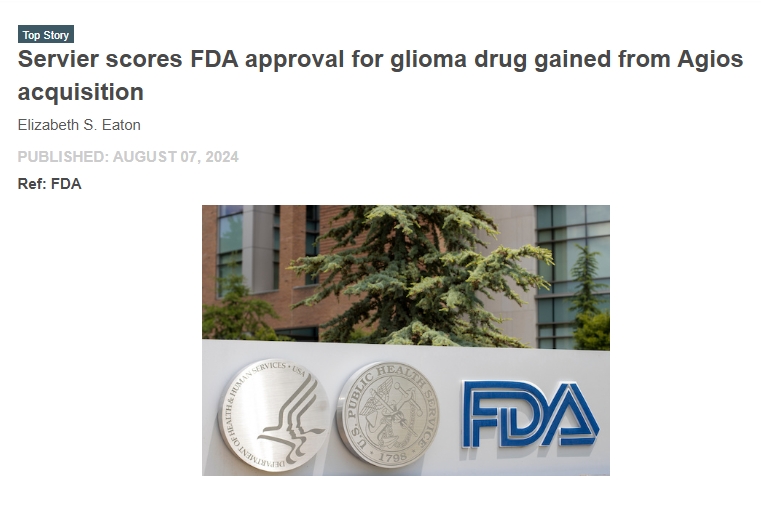Source: yaozhi website Kuihuazi
Servier's oral IDH1/IDH2 dual inhibitor vorasidenib (Voranigo) was approved by the U.S. Food and Drug Administration (FDA) on August 6, according to FirstWordPHARMA. It is used in children and adults 12 years of age or older with grade 2 oligodendroglioma or astrocytoma with predisposing IDH1 or IDH2 mutations who have previously undergone surgery including biopsy, subtotal resection, or total resection.

Image credit: FirstWordPHARMA website
Voranigo is derived from Servier's $1.8 billion acquisition of Agios Pharmaceuticals' oncology business in 2021.
FDA's First
Vorasidenib is an oral, selective, and highly brain-permeable dual inhibitor of mutant isocitrate dehydrogenase 1 and 2 (IDH1 and IDH2) for the treatment of IDH-mutated low-grade diffuse gliomas and is the first FDA-approved systemic therapy for such patients.
Glioma, a tumor originating from glial cells, is the most common primary intracranial tumor. In China, the annual incidence of glioma is 5-8/100 000, and the 5-year mortality of glioma is second only to pancreatic cancer and lung cancer. The 2021 World Health Organization (WHO) classification of tumors of the central nervous system divides gliomas into six main entities, including adult-onset diffuse glioma, pediatric diffuse low-grade glioma, and pediatric diffuse high-grade glioma. It is worth noting that isocitrate dehydrogenase (IDH) plays an important role in the WHO2021 new classification of gliomas, and its mutation status has become the main key driver of diagnosis and grading, and is closely related to the prognosis of gliomas.
At present, the treatment of glioma is mainly based on surgical resection, combined with radiotherapy, chemotherapy and other comprehensive treatment methods, with the goal of prolonging the progression-free survival and overall survival of patients as much as possible, and improving the quality of life of patients.
In June 2023, Servier presented impressive phase III INDIGO study data for Vorasidenib at the 2023 American Society of Clinical Oncology (ASCO) annual meeting.
INDIGO is a global multicenter, randomized, double-blind, placebo-controlled, phase III study comparing Vorasidenib with placebo in patients with residual or recurrent grade 2 oligodendroglioma with IDH1 or IDH2 mutations who had undergone surgery only.
Results showed that at the prespecified second interim analysis, the primary endpoint (median PFS (progression-free survival) 27.7 months vs11.1 months) and key secondary endpoints (median TTNI (time to next intervention)) were met with Vorasidenib: Not yet reached vs17.8 months), patients treated with Vorasidenib monotherapy had a statistically significant and clinically meaningful improvement in both PFS and TTNI compared with patients treated with placebo. In addition, Vorasidenib monotherapy was well tolerated.
In terms of safety, the most common adverse effects in patients treated with Voranigo were mild and included fatigue, headache, musculoskeletal pain, diarrhea, and nausea. More than 2% of patients had grade 3 or higher adverse effects, including elevations in ALT and AST liver enzymes and neutropenia.
Process of approval
In February 2024, based on the results of INDIGO's pivotal phase 3 clinical trial, the FDA accepted and granted priority review status for Vorasidenib, with a PDUFA target date of August 20, 2024, which was nearly half a month earlier than originally planned.
Meanwhile, the European Medicines Agency (EMA) has accepted an Accelerated marketing authorization application for Vorasidenib, and the European Commission expects to publish its decision on this application in the second half of 2024.
In addition to the layout of the United States and European and American markets, Servier also set its sights on the Chinese market.
In June 2024, Servier announced that it had received approval from the China National Medical Products Administration to issue a Drug Clinical Trial Approval Letter for Vorasidenib, A phase III, multicenter, randomized, double-blind, placebo-controlled study of Vorasidenib in Asian subjects with residual or recurrent grade 2 gliomas harboring IDH1 or IDH2 mutations was conducted.
Servier has continued to apply for clinical trials, and has spared no effort to develop Vorasidenib.
Servier announced on June 25, 2024 that it had entered into a strategic partnership with China's innovative molecular diagnostics company, Adbio, to develop a companion diagnostic for Vorasidenib.
The overall goal of cooperation is complete kit development, analytical validation, clinical validation, approval, production, and ultimately commercialization of a companion diagnostic reagent during clinical trials. It is used to help identify potential patients who may benefit from treatment with Vorasidenib, patients who choose to receive treatment with this drug, and to inform the safe and effective use of this drug. Edbio will use its self-developed NGSPanel to develop Vorasidenib's companion diagnostic reagent and facilitate the registration and commercialization of Vorasidenib in China when it is first approved.
Summary
As a blood-brain screen-penetrating agent, Vorasidenib has demonstrated clinically meaningful efficacy in glioma patients with IDH1 or IDH2 mutations, while maintaining a manageable safety profile and being well tolerated. The successful approval of Vorasidenib brings hope to patients with low-grade diffuse brain gliomas carrying IDH mutations and is a breakthrough in the field of glioma treatment.
Reference materials: Shi Weiya official website, official wechat
Solemnly declare: the copyright of this article belongs to the original author, reprint the article only for the purpose of spreading more information, such as the author's information is wrong, please contact us the first time to modify or delete.







